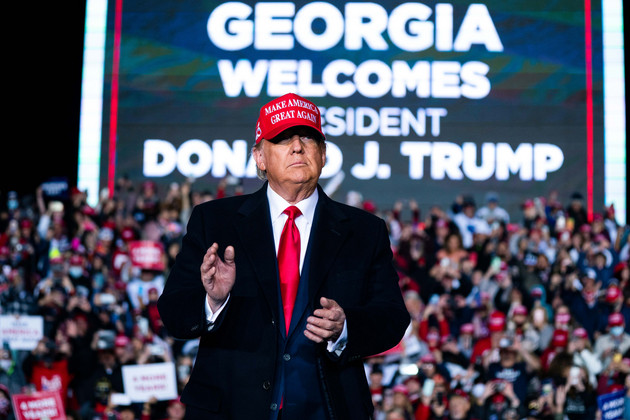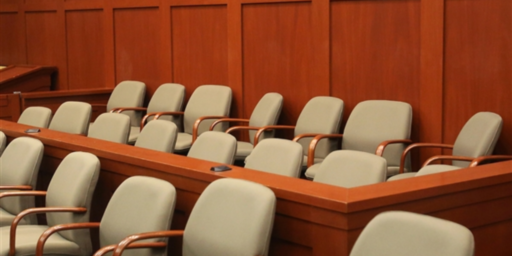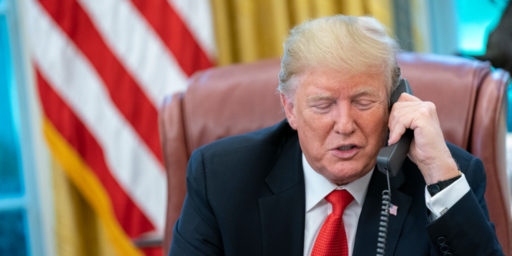The Georgia Case is Different
It's the only one that puts all the piece together.

Several analyses published late yesterday point to the uniqueness of the Georgia case compared to the three other (so far) criminal indictments against the former President Trump.
Writing in NYT, Norman Eisen and Amy Lee Copeland contend, “This Indictment of Trump Does Something Ingenious.”
When the Fulton County, Ga., district attorney, Fani Willis, filed criminal charges against Donald Trump and over a dozen of his allies for their attempt to overturn Georgia’s 2020 presidential election results, she did something ingenious.
In contrast to the special counsel Jack Smith’s latest laser-focused federal indictment of Mr. Trump, Ms. Willis charges a wide range of conspirators, from people in the Oval Office to low-level Georgia G.O.P. functionaries, and is the first to plumb the full depths, through a state-focused bathyscaph, of the conspiracy.
Her case also provides other important complements to the federal matter: Unlike Mr. Smith’s case, which will almost certainly not be broadcast because of federal standards, hers will almost certainly be televised, and should Mr. Trump or another Republican win the White House, Ms. Willis’s case cannot be immediately pardoned away. It offers transparency and accountability insurance. As she said in her news conference on Monday night, “The state’s role in this process is essential to the functioning of our democracy.”
But the indictment stands out, above all, because Georgia offers uniquely compelling evidence of election interference — and a set of state criminal statutes tailor-made for the sprawling, loosely organized wrongdoing that Mr. Trump and his co-conspirators are accused of engaging in. It is a reminder of the genius of American federalism: When our democracy is threatened, states have an indispensable part to play in protecting it.
[…]
American law has long recognized through the crime of conspiracy that combinations of criminals are more dangerous than lone wolves. RICO is conspiracy on steroids, providing for stiffer penalties and other advantages like bringing multiple loosely connected conspiracies under one umbrella.
Georgia has one of the most capacious RICO statutes in the country. The state’s legislature enacted it specifically to “apply to an interrelated pattern of criminal activity” and mandated courts to “liberally construe” it to protect the state and its citizens from harm. Under the law, prosecutors can charge a sprawling criminal enterprise and even include individuals who may not have known “of the others’ existence,” as one court put it.
Writing at WaPo, Amy Gardner, Holly Bailey, Amber Phillips and Shayna Jacobs see “Georgia and federal indictments, two vastly different approaches.”
Charges against former president Donald Trump and a raft of others in Fulton County, Ga., over their alleged efforts to overturn his 2020 defeat finally landed Monday, the result of a sprawling investigation that stretched over 2½ years and led to a complex racketeering case featuring 41 criminal counts against 19 defendants in a massive 98-page indictment.
Contrast that with a federal indictment filed against Trump on Aug. 1 in Washington that also accuses him of illegally attempting to subvert and overthrow the election. In that case, Justice Department prosecutors sought charges against Trump alone. They appeared to be aiming for speed and simplicity, producing a 45-page indictment featuring four charges after an investigation of the former president that began well after the Fulton probe.
Unlike the Georgia indictment, which alleges multiple instances of making false statements, witness tampering and impersonating a public officer — among dozens of other counts — the federal indictment avoids potentially complicated accusations that some advocates pushed for, such as seditious conspiracy or insurrection.
Legal experts said the difference in strategy comes with some advantages: District Attorney Fani Willis’s sprawling case will allow Fulton County prosecutors to tell the jury a story of a broad conspiracy to reverse election results in multiple states and build a forceful narrative of Trump’s actions in concert with numerous aides, lawyers and local officials. But experts warned that the logistics of putting Trump on trial along with 18 other people — each of whom may file a flurry of pretrial motions — in a racketeering indictment so complex and multilayered could carry unique difficulties.
Trump and his allies have attacked both Willis, a Democrat, and special counsel Jack Smith of the Justice Department for investigating alleged election interference, accusing them of conducting political witch hunts and attempting to interfere with the former president’s 2024 bid for the White House.
But even some of Trump’s critics have questioned the apparent breadth of Willis’s investigation and the challenge she faces in persuading a jury to criminalize statements about election fraud — including portraying a few seemingly innocuous tweets as furthering the conspiracy — that many view as protected speech under the First Amendment. She will also have to convince a jury that Trump and others knew what they were saying was false, and that they are not protected by the fact that in many instances they were following the advice of their lawyers.
Willis’s ambitious decision to use Georgia’s expansive RICO statute — a law historically employed to prosecute mobsters — to charge Trump with leading a vast criminal enterprise to steal the 2020 election could allow her to target many more of those involved in the alleged conspiracy beyond Trump, potentially transforming the way political wrongdoing is punished.
Alternatively, her gambit to try all 19 defendants together could be seen by jurors as a massive instance of prosecutorial overreach. And despite Willis’s statement late Monday that she’d like to see a trial date within six months, the sprawling nature of the case could push the start beyond the 2024 election and take years — and many appeals — to resolve.
“This is eye-popping,” said John Malcolm, a former federal prosecutor based in Atlanta who is now a constitutional scholar at the conservative Heritage Foundation, speaking of the contrast between the federal and state indictments. “What about the right — when you believe allegations to be true, or you have some evidence to support the allegations — to seek redress? And all of a sudden they’re perpetrating a conspiracy? I think that’s astonishingly dangerous.”
Writing at The Bulwark, law professor Kim Wehle argues “This Indictment Hits Different.” Afer rehashing what others have said, she observes,
Much of the commentary thus far has focused on Georgia’s RICO law, which allows prosecutors to indict people who are part of a criminal “enterprise,” like a mafia mob or a gang, without showing an actual agreement (as the crime of conspiracy, by contrast, requires), and without having to prove a particular state of mind on the part of the mob “boss” (that is, Trump). The law requires prosecutors to prove a pattern of unlawful conduct—not necessarily separate crimes—with at least two of them occurring within a four-year time span. The indictment lists a whopping 161 predicate acts as part of the alleged enterprise.
After noting that conviction on RICO carries a minimum sentence of five years and that a re-elected Trump would lack the ability to pardon a state conviction, Wehle observes,
[T]his indictment is the only one that arguably includes metaphorical ‘dead bodies’ strewn across the stage—so that jurors can viscerally understand the case, which will be necessary if they are going to convict a former president. So far, it’s unclear what harm, if any, befell national security as a result of the Mar-a-Lago classified documents case. Prosecutors need to figure out a way to show that Trump’s astonishing recklessness actually hurt people. The January 6th indictment consists of three conspiracy charges and one count of obstructing an official proceeding—all important charges for our democracy and for the rule of law, but relatively abstract concepts that could be hard for jurors to get upset about.
The Georgia indictment, however, is different. It involves real people with respectable lives who suffered serious harm. In addition to the charges listed above, it includes Influencing Witnesses (as well as Criminal Attempt to Commit Influencing Witnesses). These charges relate to the heartbreaking story of two election workers, Ruby Freeman and her daughter Shaye Moss. According to the indictment, Donald Trump and Rudy Giuliani labeled Freeman “a professional vote scammer and known political operative” who “stuffed the ballot boxes.” She and her daughter were accused by Trump and his operatives with being “responsible for fraudulently awarding at least 18,000 ballots to” Biden. Another co-defendant, Trevian Kutti, Kanye West’s ex-publicist, allegedly traveled to Freeman’s home and attempted to pressure her into admitting baseless fraud claims or face arrest within 48 hours.
Moss told the House January 6th Committee that an anonymous caller told her: “You should be glad it’s 2020 and not 1920,” a phrase that appeared to invoke the violent history of Southern segregation and lynching. Said Moss:
It has turned my life upside down. I no longer give out my business cards. I don’t transfer calls. I don’t want anyone knowing my name. I don’t want to go anywhere with my mom because she might yell my name out over the grocery aisle or something. I don’t go to the grocery store at all. I haven’t been anywhere at all. I have gained about sixty pounds. I just don’t do nothing anymore. I don’t want to go anywhere. I second-guess everything that I do. . . . All because of lies, of me doing my job, same thing I have been doing forever.
Her mom gave an account of how the episode has affected her life, too:
I wore a shirt that proudly proclaimed that I was, and I am, Lady Ruby. Actually, I had that shirt on—I had that shirt in every color. I wore that shirt on Election Day 2020. I haven’t worn it since, and I’ll never wear it again. . . . I’ve lost my name, and I’ve lost my reputation. I’ve lost my sense of security, all because a group of people, starting with Number 45 and his ally, Rudy Giuliani, decided to scapegoat me and my daughter Shaye—to push their own lies about how the presidential election was stolen.
Fourth, the Georgia indictment includes charges of Conspiracy to Commit Election Fraud, Conspiracy to Commit Computer Theft, Conspiracy to Commit Computer Trespass, and Conspiracy to Commit Computer Invasion of Privacy. It them outlines a series of illegal breaches of election equipment in Coffee County, Georgia, allegedly made in an effort to reveal evidence of fraud that never materialized. Sidney Powell and other co-defendants allegedly “trespassed” into election computer systems “with the intention of removing voter data and Dominion Voting Systems Corporation data.” That’s the same Dominion Voting Systems that won a $787.5 million settlement with Fox Corporation in a defamation case that exposed the network’s lies about the integrity of the voting systems in this country.
Jurors of whatever political stripe will understand that hacking into voting systems is a no-no. They will understand it because the claim was the basis of Team Trump’s months-long assault on the legitimacy of the 2020 presidential election.
In other words, this case exposes the Big Lie for what it is: a massive projection from Trump’s disturbed mind, which pathologically accuses everyone else of things that only he and his allies had the audacity to do.
As noted yesterday, I have instinctive qualms about RICO laws and other tools that make it easier for prosecutors to convict those they accuse of crimes and to coerce them into testimony, confession, or plea deals. That said, I support their ostensible original aim of making possible the prosecution of organized crime bosses who orchestrate but shrewdly distance themselves from the routine commission of crime. While I think Trump’s crimes are more in my lay understanding of “conspiracy” rather than “organized crime,” the similarities are close enough that I don’t object to the application of RICO here.
As to the likelihood that this trial will be televised, my instinct is to welcome it. There are, however, many legal experts who think it invites circus and, more importantly, makes witness intimidation more likely. Still, given the inherently polarizing nature of prosecuting a man a significant number of Americans think was wrongly deprived of the presidency, making more prominent things like the story Ruby Freeman and Shaye Moss tell is necessary to convince people that Trump did, indeed, do things serious enough to merit imprisonment.





I doubt if it could be any more of a circus than it already is. But televising the trial would have the effect of bringing Trump into the same setting as real people, he wouldn’t be the center of attention (which alone would drive him nuts) and he would be forced to be passive and follow instructions/orders from the bench (which would make him look like a p*ssy to his MAGA-nutbar followers).
If we got really lucky he would be wearing the orange uniform and going back to his jailcell every night. The concern of the authorities would be that this would turn him into a martyr but my response is: he’s already calling himself a martyr, what does it matter? The more often Trump is seen in the real world, the faster his status will melt away.
I’m coming around to thinking that the real issue with his more passive fans is that this is all some kind of reality show to them, and will remain that way as long as he’s only seen in settings that he controls or his people have set up. Bringing him down to earth in a televised trial would be eye-opening for them. And since his self-esteem is based in part on his television success, it would be just as awful for him as the trial itself.
What about Trump’s MO since coming down the escalator (and before) is not more like “organized crime”? Not only has his business been convicted of fraud and his CFO and his consigliere have both done jail time, his kids are constantly doing shady sh-t and we have been talking for 7 or 8 years here about how he talks like a Mafia don. The behavior alleged here totally fits the bill of “organized crime” except for the “organized” part.
Lock! Him! Up!
Lock! Him! Up!
Lock! Him! Up!
I love the taste of schadenfreude in the morning.
@DK: Trumpenfreude.
A significant number of Americans believe the election was stolen only because Trump told them it was, and the rightwing media echo chamber pushed his dishonest, concocted theory into the country’s consciousness. The indictments from Jack Smith and Fani Willis both stated up front that Donald Trump lost the 2020 election. They understood that to be a predicate to Trump’s criminal behavior. I’m still waiting for the so called liberal media to do an in-depth report on the legitimacy of the 2020 election. There’s been wall to wall coverage of Trump’s rantings with only passing references to the fact that Trump is “mistaken,” or his claims are “baseless.” Why not aggressively state the 2020 election was fair, the counting of ballots was accurate, there was no outcome changing fraud, and it was the most secure election in our history? Lay it out. Cite security experts. Mention the 60 judges who dismissed the challenges. Yank the rug from under Trump’s feet without even mentioning his name.
@Charley in Cleveland:
You don’t think that has been happening? The problem is the “news” outlets that Trump’s base follow have been doing the exact opposite since the election. They never hear any of it.
I wish it were just that easy.
@DK: @Kylopod: To add to the schadenfreude, you can fantasize a similar scenario to which Sam Bankman-Fried is being subjected to (discussed last Friday here ) in the Metropolitan Detention Center in Brooklyn:
Compare and contrast to the Fulton County Jail:
Trump’s time in Fulton County Jail will be brief. Others die waiting
@Not the IT Dept.: There’s zero chance that he goes to prison before conviction unless he demonstrates a legitimate flight risk (unlikely) or tampers with the witnesses/co-conspirators (more likely).
@Joe: The various shady business dealings aren’t part of this case. It’s just the election fraud stuff. I’m skeptical that this is “organized crime” in any ordinary sense because it’s naturally sui generis. This prosecutor has managed to prosecute much less serious offenses under the state’s RICO statute, though, so Georgia’s conception of “racketeering and organized crime” is much broader than the common one.
@Charley in Cleveland: The mainstream press, prosecutors, etc. have been stating forthrightly that Trump’s claims are baseless since, oh, November 2020. Who is it that you want to make that statement that isn’t already?
I still think that what these @ssholes did to those election workers (and many other election workers across the country) is unforgivable. These poor people were just doing the jobs they were trained to do.
I will never, ever forgive Trump, his minions, and the Republican party for all that they’ve done to undermine faith in our electoral process. Never.
I desperately hope this case is different. There needs to be some accountability and thus far there has been none.
@Charley in Cleveland: One problem is that the mainstream news tries to emphasize the legal aspects of the case, which distracts them from debunking the Trump team’s election lies. Last week Trump’s lawyer in the Jan. 6 case was on TV spouting election-denial talking points (Trump’s early lead on Election Night, his carrying many so-called bellwether counties–as if those are proof of anything), and the anchor didn’t push back since none of that was relevant to the legal case against Trump. The problem is that the lawyer didn’t seem to be trying to make a serious legal defense of Trump at that moment; he was just trying to spread Trumpist propaganda.
@Charley in Cleveland:
The GOP base has been indoctrinated to regard the hated “MSM” as a conspiracy to mislead them.
They *literally respond with anger if anyone attempts to show them content from the New York Times, Washington Post, NPR, PBS etc., thus unreachable.
*I have personal experience of this.
The Conservative information bubble, Fox, Newsmax etc. is literally impenitrable.
@Kylopod:
There’s the old legal maxim:
If the facts favor you, argue the facts.
If the law favors you, argue the law.
If neither facts nor law favors you, make a lot of noise and throw sh*t around.
@James Joyner:
Who said anything about him going to prison? He wouldn’t be the first person locked up in a jail during his trial. And who says he’s not a flight risk? He’s got a private plane, a bad attitude and increasing reason to disrupt the proceedings. And since his social media gets more unhinged everyday, keeping him from spewing threats around is a sound idea.
I would love to see clips of him being forced into handing over his cell phones before he’s locked up. The melt-down of all melt-downs would result.
@James Joyner: I think Charley in Cleveland is expressing frustration with the language. There is a difference between “Trump election lies”, “Trump’s statements are baseless”, “election claims found baseless”, “no evidence has been found”. Basically saying the same thing but using language actively or passively.
The same thing happened during the pandemic. Health officials, doctors, and scientists used language that was not very definitive reflecting their normal training to speak in terms of probability and uncertainty which then allowed bad faith actors to sow doubt and confusion.
It is very frustrating. Language does matter.
@Not the IT Dept.: Sometimes I think trump running off to Saudi Arabia or Russia or Venezuela would be the best thing possible for everyone. He’d still get tried in absentia, and everyone would know that he is a craven coward because he “left the field of battle” running away like the little mouse he is. Besides, then he is their problem.
eta: I meant to add that I really doubt he will ever see the inside of a prison or any more of a jail than maybe a holding cell for an hour or 2. I suspect he will get house arrest with severe limits on communication with the outside world.
@Kathy:
It is so much fun to go full Chewbacca in court. The only thing better is when you pull it off. You can live off that high for weeks.
@Beth: For years now I’ve thought of Rudy as the closest real-life approximation of someone doing the Chewbacca defense, except I’ve never been sure it’s a conscious strategy with him. He may actually be this brain-addled.
@charontwo:
The MAGAs believe, along with Trump, that the NYT, WaPo, etc. only print lies and disortions about anything Trump-related. To them it is lierally Fake News.
As for Fox, if you’re a true MAGA, you spurn it for being far too left-wing.
@Kylopod:
No way he did it intentionally. To do something like that you need to be very clear headed, know where your strengths and weaknesses are, know the judge, and have a VERY clear understanding of where the lines are. Some lines you can dance on, others you can’t touch at all, some you can cross. No way does Rudy have any idea of that.
@Beth: Well, the recently released audio transcripts from the sexual harassment suit he’s embroiled in pretty much confirm that the man is, genuinely, a certifiable lunatic–it isn’t just a persona he adopts in public. (I suppose we could say he was doing the Chewbacca defense to that woman.) So I tend to agree with you. It’s just that, regardless of his intentions, he was someone that Trumpworld continued to find useful, and I think that says something about what they were aiming to do and how they believed they could effectively go about it.
@James Joyner: I have not been around a criminal RICO case in a couple of decades, but I suspect most of them are about a single goal of the more general criminal enterprise. No one is going to prove the whole sprawling criminal lifestyle.
@James Joyner: I have not been around a criminal RICO case in a couple of decades, but I suspect most of them are about a single goal of the more general criminal enterprise. No one is going to prove the whole sprawling criminal lifestyle.
Except for Trump and Meadows and a few others who can get their trials transferred to Federal court. Say what you will; it’s still a binary system. The small fry pay more and pay harder.
@Just nutha ignint cracker:
https://twitter.com/TamarHallerman/status/1691817564517642576
My emphasis.
@Joe:
And also, not to beat a drum on this, but it’s really important to understand:
1. Federal RICO <> State RICO
2. State [X] RICO <> State [Y] RICO
Which makes all of these discussions so fun. My understanding is that Georgia RICO is so broad that it doesn’t make sense to talk about it in terms of traditional “criminal enterprises.”
@Matt Bernius: Even federal RICO is not strictly limited to traditional “criminal enterprises.” I am defending a federal civil RICO case now that is, at base, a dispute over software ownership, to which I will take the position federal RICO does not apply if we get that far.
@OzarkHillbilly:
I think that all the time. Trump isn’t a flight risk, he’s an un-flight risk.
@Charley in Cleveland:
I’m beginning to suspect the primary value of the Georgia indictment might work out to the trial being televised, with all but certain extremely high ratings. This would, at least to some degree, bust some info-bubbles.
According to NBC, a crackpot right-wing website has published the names and addresses of the Georgia grand jurors.
Said one poster on a pro-Trump forum: “These grand jurors have signed their death warrant by falsely indicting President Trump.”
@charontwo: Thank you for the correction.
@CSK: This is exactly the type of nonsense that could injure or kill someone. JFC.
Lengthy article, but worthwhile:
https://www.lawfaremedia.org/article/what-the-heck-happened-in-coffee-county-georgia
I will repost this again tomorrow in teh Thursday link, as it is that good.
@Jen:
Where is all this rage and hatred coming from?
@CSK: Fox News and the right wing Mind Bubble.
Is it possible to sue Fox News for starting this bullshit, all the way up to trying to overthrow the government?
@Just nutha ignint cracker:
I’ve seen conflicting versions though, you might have been right.